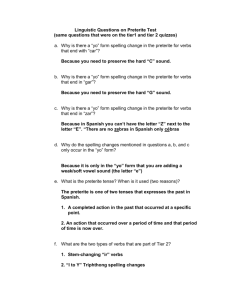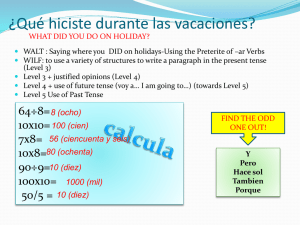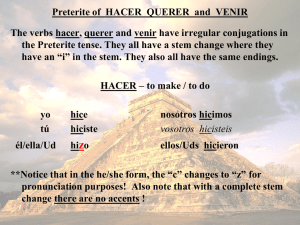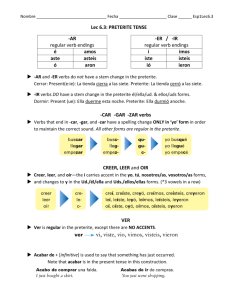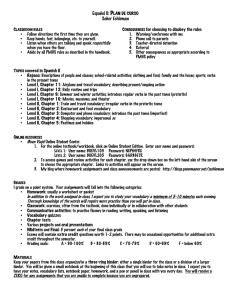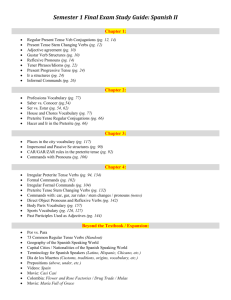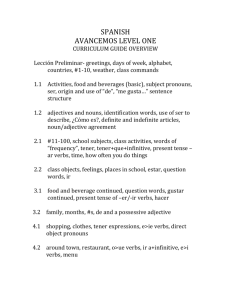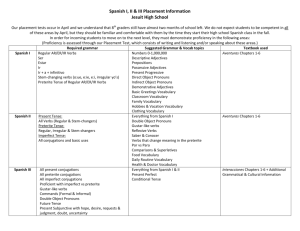The Preterite Tense - Spanish Planet
advertisement
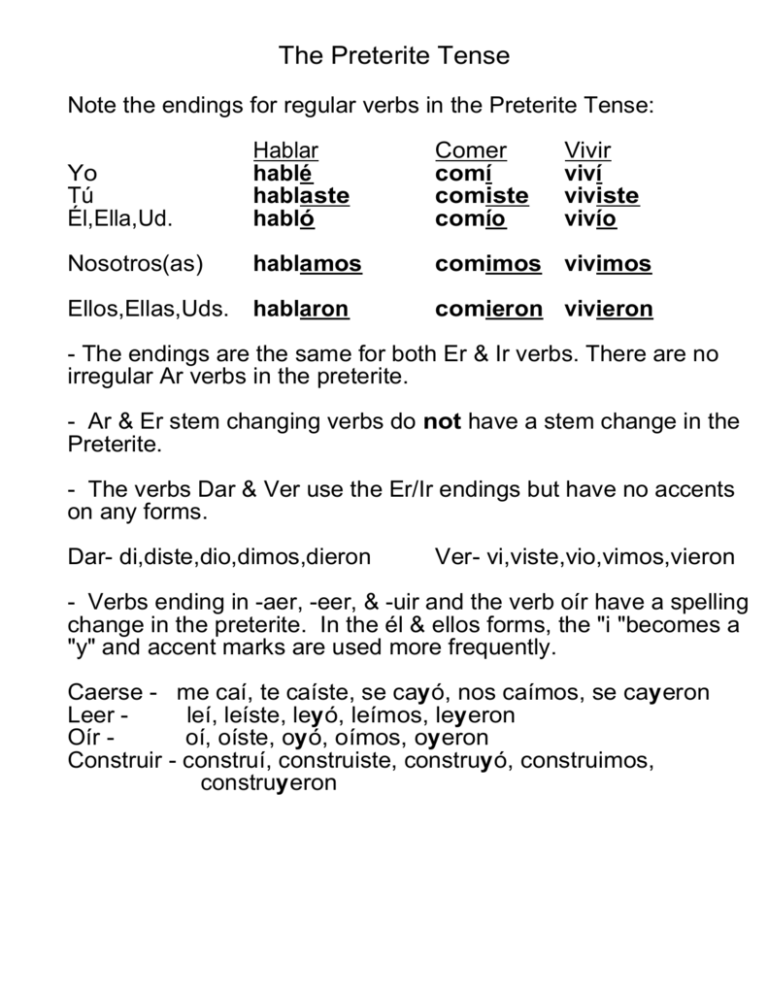
The Preterite Tense Note the endings for regular verbs in the Preterite Tense: Yo Tú Él,Ella,Ud. Hablar hablé hablaste habló Comer comí comiste comío Vivir viví viviste vivío Nosotros(as) hablamos comimos vivimos Ellos,Ellas,Uds. hablaron comieron vivieron - The endings are the same for both Er & Ir verbs. There are no irregular Ar verbs in the preterite. - Ar & Er stem changing verbs do not have a stem change in the Preterite. - The verbs Dar & Ver use the Er/Ir endings but have no accents on any forms. Dar- di,diste,dio,dimos,dieron Ver- vi,viste,vio,vimos,vieron - Verbs ending in -aer, -eer, & -uir and the verb oír have a spelling change in the preterite. In the él & ellos forms, the "i "becomes a "y" and accent marks are used more frequently. Caerse - me caí, te caíste, se cayó, nos caímos, se cayeron Leer leí, leíste, leyó, leímos, leyeron Oír oí, oíste, oyó, oímos, oyeron Construir - construí, construiste, construyó, construimos, construyeron - Ir Verbs which have a stem change in the Present Tense also have a stem change in the Preterite Tense. This change only happens in the él and ellos forms. Pedir (e -> i) Dormir (o -> u) Juan pidió el coche a su papá. Ellos pidieron agua en el restaurante. Juan durmió bien anoche. Ellos no durmieron en su casa anoche. - Verbs ending in -car, -gar, & -zar have a spelling change in the yo form of the preterite -car (c->qu) -gar (g->gu) -zar (z->c) Yo saqué muchas fotos ayer. I took a lot of photos yesterday. No pagué mucho dinero por el libro. I didn't pay a lot of money for the book. Almorcé en un restaurante mexicano. I had lunch in a Mexican restaurant. - Note the forms of reír (to laugh) and sonreír (to smile): reír sonreir - reí, reíste, rió, reímos, rieron sonreí, sonreíste, sonrió, sonreímos, sonrieron Preterite Tense - Ir & Ser (to be, to go) Note the Preterite Tense forms of Ir & Ser. They are the same for both verbs. Yo Tú Él,Ella,Ud. Ir fui fuiste fue Ser fui fuiste fue Nosotros(as) fuimos fuimos Ellos,Ellas,Uds. fueron fueron - The context of the sentence will usually tell which verb is being used. Fui al supermercado. Juan fue un estudiante malo. I went to the supermarket. Juan was a bad student. Preterite Tense - Irregular Forms - The "j" Group (To drive) Certain verbs are irregular in the Preterite Tense and have a "j" in the stem. They are conjugated like "Conducir" below: Yo Tú Él,Ella,Ud. Conducir conduje condujiste condujo Nosotros(as) condujimos Ellos,Ellas,Uds. condujeron - The verbs Decir (to say), traer (to bring), and verbs ending in -ucir are conjugated like conducir in the Preterite Tense. - These verbs all have a preterite stem ending in -j. Therefore this is called the "j" group. - They all use the same endings -e, -iste, -o, -imos, -eron Preterite Stems decir dijtraer trajproducir produj- traducir (to translate) traduj- Other Irregular Preterites - The "u" and "i" Groups Certain verbs have irregular Preterite Tense forms which have a "u" or an "i" in the stem. They follow the conjugation of Estar below: Yo Tú Él,Ella,Ud. Estar Estuve Estuviste Estuvo Nosotros(as) Estuvimos Ellos,Ellas,Uds. Estuvieron - None of the forms require accent marks. Other Irregular Verbs Using These Same Preterite Endings Infinitive Preterite Stem the "i" group hacer hic(él form = hizo) querer quisvenir vinthe "u" group andar estar poder poner saber tener anduvestuvpudpussuptuv- ¿Qué hiciste ayer? No quise ir a la escuela ayer. Mario no vino a la fiesta. Enrique anduvo rápidamente. Estuvimos enfermos ayer. No pude hacer las tareas. Armando se puso furioso. Elena supo la verdad. No tuve dinero para ir al cine. - Certain verbs change meaning when used in the PreteriteTense: conocer querer no querer saber tener Present to know to want to not want to know to have Preterite to meet for the first time to try to refuse to find out to receive (got)
